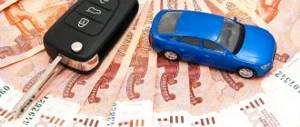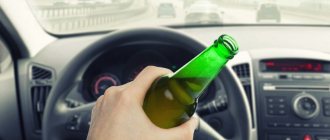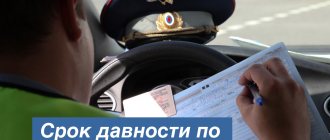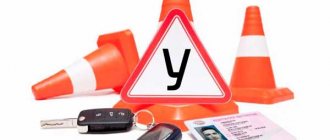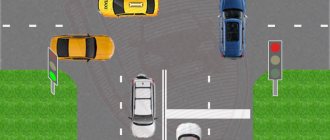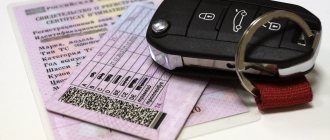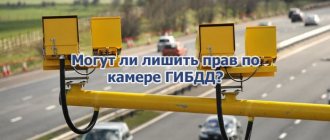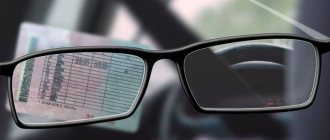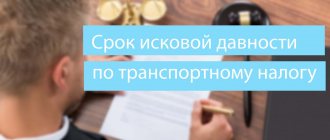Material checked by Expert: Anastasia Tabalina
Experienced lawyer, auto lawyer. Legal assistance in case of deprivation of a driver's license.
Our dear readers, today we will tell you how to pay a fine of 30,000 to the traffic police for deprivation of your license. In what case is the appropriate punishment imposed? Let's consider the most economical ways to repay the debt and the maximum terms, the possibility of paying the amount in installments.
Drivers will have to pay a fine of 30,000 for driving while intoxicated. In addition, for the corresponding offense, the traffic police officer imposes deprivation of rights. In this material we will discuss all the nuances of the issue, we will tell you in what situations you can pay half or part of the amount.
Attention!
In addition to a fine of 30,000 rubles for drunk driving, a license deprivation of 2 years is imposed.
The legislative framework
| № | Title, date of adoption of the bill | Issues that are regulated |
| 195 | Federal Law of the Code of Administrative Offenses, dated December 30, 2001 | Determines penalties for violation of traffic rules, deadlines for payment of penalties |
| Federal Law of the Criminal Code, dated June 13, 1996 | Indicates the consequences that may occur for malicious evasion of a sanction and repeated driving while intoxicated | |
| 1090 | Traffic rules dated October 23, 1993 | Specifies the rules for violation of which the driver faces punishment |
Implementation of punishment for drunk driving
| № | Action | A comment |
| 1 | Making a decision | The amount in 2021 is 30,000 rubles |
| 2 | Entry into force of the decision | After notifying the driver. As a rule, the letter is delivered within 11 days |
| 3 | Allow 60 days for payment | If you do not apply for an installment plan or deferment, this will be the maximum period for repayment |
| 4 | Transfer of a resolution for forced collection of debt | 10 days after 2 months - the period during which the court decision is sent to the executive service |
| 5 | Initiation of proceedings | A protocol on non-payment of the sanction on time must be drawn up, which is forwarded to the magistrate for issuing measures for non-payment. This is Art. 20.25 Code of Administrative Offenses |
What the law says
Each driver can refuse the on-site examination procedure, that is, from blowing into the mouthpiece, but in this case he will have to go to a medical facility.
A driver who is confident that he is right will never refuse an examination, because he has nothing to hide, and if he refuses, then the traffic inspector will have questions!
According to Article 12.26 of the Code of Administrative Offenses, a driver who refuses the procedure is fined for driving while intoxicated . Its amount is 30,000 rubles and deprivation of a driver’s license for a period of 2 years.
If a driver drives a car without a license, he faces detention for 15 days or a fine of 30 thousand rubles.
In some cases, a drunk driver is locked up for 15 days
Fine for repeated drunk driving
Those motorists who risk driving while drunk again will face a completely different punishment. This is a 10-fold increase in penalties. That is, the second fine for driving while drunk will be 300,000 rubles. In addition, the driver will be prosecuted and his license will be taken away for 3 years.
Drunk driving for the third time
If a drunk driver comes to the attention of traffic police inspectors for the third time, he faces a fine of 300,000 rubles, deprivation of his license and mandatory correctional labor.
What is the penalty for transferring a car to a third party who is drunk?
The owner of a car who gives the right to drive it to a drunk driver is also breaking the law. For this, responsibility is provided for both the driver and the owner. A fine of 30,000 rubles for both and confiscation of the vehicle owner’s license.
Can your license be revoked for drinking alcohol in a parked car?
Drivers who drive while drunk are held accountable. However, there is no article of law that would regulate the issue of a drunk driver being in a stationary car.
However, this does not mean that the traffic inspector does not have the right to fine a driver who drinks alcohol in his car or is already drunk.
It will be very difficult to challenge the imposed fine, since the court almost always takes the side of the traffic police inspectors. Why? You can expect anything from a drunk driver. He can go when no one expects it from him, especially if the engine is not turned off.
Deadlines for paying traffic fines
With the tightening of measures against the violator, the deadlines for payment were revised. If a monthly period was previously set. After increasing the amount to 30,000 rubles, “letters of happiness” can be covered within 60 days. Considering that another 10 days are given to challenge the decision, the maximum period is 70 days.
Important!
Those drivers who do not sign the delivery will also have to pay. In this case, the period will begin to count from the moment the postal stamp is placed confirming the return of the letter to the sender.
The countdown of the total period begins from the date of delivery of the decision. The offender signs receipt on the postal notice, which serves as proof of delivery. If the relevant document is not delivered to the addressee, it will be returned to the sender. In this case, the starting point for calculating the deadlines will be the date of stamping.
The limitation period for sanctions should be addressed. It is two years. If the bailiffs came to the address but did not find the offender, then they have the right to double the limitation period. Even if the statute of limitations expires, it will not be possible to return rights without paying off all administrative penalties.
On a note!
“Letters of chain” reach recipients approximately 11 days after the court decision is made. They can be sent to an email via Russian Post.
Deadline for paying a fine for driving without rules
How long does it take to pay 30,000 rubles?
Administrative fines must be paid no later than 60 days from the date of entry into force of the court decision , this also applies to the fine for deprivation of rights for driving while intoxicated. However, it is worth considering that the offender is given 10 days to appeal the court verdict. It turns out that the deadline for paying an administrative fine for depriving the rights of a person under the influence of alcohol is 70 days after the announcement of the court verdict.
In the event that an offender who has been deprived of a certificate, without a valid objective reason, does not pay the fine, liability arises under Article 20.25 of the Code of Administrative Offenses of the Russian Federation, which prescribes the following penalties for evading the fulfillment of obligations under the fine:
- an administrative fine equal to twice the amount of the previous punishment;
- compulsory work for up to 50 hours;
- administrative arrest for up to 15 days.
The sooner the fine is paid, the fewer problems the offender will have. If you do not fulfill your obligation to pay a fine after receiving a notice of delay, the bailiffs will take control of the matter and will forcibly demand that the debt be repaid.
Is it possible to extend payment deadlines?
With the tightening of penalties and an increase in the amount, the need arises to defer payment. 30,000 is an amount that not everyone can afford to give in two months. The legislation provides preferential ways to cover debt.
How to extend payment deadlines
| Way | Condition | Implementation | A comment | Bottom line |
| Postponement up to 30 days | Insufficient income Other reasons that the court qualifies as valid | Applying to the court for a postponement | Income certificates must be submitted along with the application. Other documents that confirm the impossibility of paying the entire amount on time will also be suitable. | Making a decision to grant a deferment/decision to refuse a claim |
How to pay with a minimum commission
With such a significant amount, the violator is faced with the question of how to pay the penalty as economically as possible. Let's look at the most convenient and common payment methods in the table.
How to pay
| № | Payment method | Implementation | Peculiarities | Repayment procedure |
| 1 | Via the Internet on the traffic police website | Individual account on the structure’s website | Disadvantages include linking identification to the registration certificate. Inability to make payments through electronic payment systems. | Go to the traffic police website Follow the link “Check fines” Enter data for identification Display sanctions Follow the link “Pay online” Select a payment method |
| 2 | Via SMS | For these purposes, the “Staff Traffic Police Autopayment” service is provided. The system operates through Sberbank, which independently checks for fines and sends notifications to subscribers. They determine the number of the resolution, the principal and commission amount | Requirement to connect to the service Minimum commission | Leave a request in your personal account “Sberbank Online” by going to the “Autopayments” section Filling out the driver’s license number, registration certificate |
| 3 | At a Sberbank branch | Transfers through banking structures occur on a first-come, first-served basis based on form No. PD-4 | Link to the work of branches The need to queue up | You can take the form and fill it out at a bank branch. The second option is to generate a payment slip on the traffic police website and print it. Pay the receipt through the cash register, terminal, mobile and internet banking |
| 4 | Electronic payment systems | Yandex systems available today. Money, WebMoney and Qiwi | Convenience Short transfer times | Go to the desired service Select “Payments”, subsection “Traffic Police Fines” Search for sanctions using specified parameters (VU or vehicle number, UIN) Select the “Pay” option |
Important!
You can also make a repayment using a receipt at a Russian Post office.
Is it possible to pay half the amount?
If the defendant does not have the opportunity to pay the entire amount at once, he should take care of obtaining an installment plan or deferred payment. This right is provided for by the Code of Administrative Offences. But many drivers receive a 50% discount if the administrative sanction is paid off soon, thus paying half instead of the entire amount.
In order to save, the violator needs to pay a fine within 20 days. This is a great opportunity to cut costs. More than 60% of drivers enjoy this benefit. But it does not apply to all cases.
When there is no 50% discount
| Violation | Norm of the Code of Administrative Offenses for restrictions |
| Repeated driving without registration | Part 11 of Article 12.1 |
| Driving at a prohibitory traffic light again | Part 3 of Article 12.12 |
| Drunk driving/transferring a vehicle to a person under the influence of alcohol | Article 12.8 |
| Violation causing harm to the victim | Article 12.24 |
| Condition under the influence of psychotropic and narcotic drugs, alcoholic beverages after an accident (until the end of the medical examination) | Article 12.27 |
| Driving in the oncoming lane again | Part 5 of Article 12.15 |
32.2 of the Code of Administrative Offenses stipulates exceptions in which a 50% discount is not assigned.
Possibility of installments
| Possibility of split payment | Assignment condition | Implementation | A comment | Bottom line |
| Installment payment up to 90 days | Income values below the minimum Other reasons that the court qualifies as valid | Applying to the court for an installment plan | Income certificates must be submitted along with the application. Depending on the situation, other documents may be required, which confirm the impossibility of paying the entire amount on time | An individual payment schedule is drawn up, which cannot be violated |
You can apply for installment plans in pdf format.
Payment of a fine for deprivation of rights due to alcohol intoxication
You will have to pay 30,000 rubles if you drive a car while intoxicated. A fine and deprivation of rights are a measure of deprivation that can be imposed when an offense is recorded by a traffic police officer. A protocol must be drawn up that determines the fact of a violation. Based on it, a decision is made, according to which a fine is paid.
Grounds for deprivation of a license and a fine of 30,000 rubles
| № | Situation | Peculiarities |
| 1 | Driving a car while intoxicated | The results are recorded in an official conclusion |
| 2 | Narcotic, psychotropic intoxication when driving | An examination is being carried out |
| 3 | Refusal of medical examination | This is indirect evidence of exceeding the permissible levels of alcohol, the presence of drugs in the blood |
| 4 | Transferring control to a drunk driver | Equivalent to drunken driving |
| 5 | Use of illegal drugs after an accident until the completion of the examination | The use of psychotropic and narcotic drugs and alcohol is prohibited. It will not be considered a violation to receive them at the end of the examination. |
On a note!
Repeated driving while intoxicated, after deprivation of the license, threatens the offender with severe financial sanctions in the range of 200,000 - 300,000 rubles. In this case, the right to drive is limited for 3 years. They may also impose compulsory labor for up to 480 hours or forced labor/imprisonment for up to 2 years. These measures provided for in Art. 264.1 of the Criminal Code of the Russian Federation.
In a state of alcohol or drug intoxication, or under the influence of psychotropic drugs, the driver loses control and cannot adequately assess the situation on the road. After an accident, the offender will have to pay a fine in the future. An additional penalty is deprivation of your license for driving while intoxicated.
Which violations are subject to the largest fines?
The list of offenses by motorists that entail the imposition of an administrative fine is very long. But there are four cases when a violation entails the most serious consequences and large monetary penalties.
These include:
- driving while intoxicated;
- transferring the right to drive a car to a person who is in a state of alcohol or other intoxication;
- refusal of a medical examination is considered as confirmation by the motorist of his drunken state;
- presence of prohibited drugs in the driver’s blood during examination.
All these violations entail a fine of 30,000 rubles and deprivation of a driver’s license for a period of one and a half to two years. If you do not pay a fine for deprivation of rights of 30,000 rubles, the punishment only gets tougher.
What happens if you don’t pay a fine when you lose your license?
After 70 days (maximum period), traffic police officers make a decision within 10 days to forcefully collect the amount of the debt. To execute the sentence, the case is sent to the executive service.
For late payment, the intention to avoid a fine, the violator faces liability under Article 20.25, Part 1 of the Code of Administrative Offenses of the Russian Federation.
The Code of Administrative Offenses for failure to pay a fine defines three types of punishment:
| № | Type of punishment | Peculiarities |
| 1 | Additional fine | Double amount of the principal amount is assigned |
| 2 | Administrative arrest | The Code of Administrative Offenses determined 15 days of arrest |
| 3 | Purpose of public works | Period up to 120 hours. The duration of the deprivation is about 2.5 months. Working hours cannot exceed 12 hours per week. |
On a note!
Arrest is an extreme measure that is applicable only to persistent defaulters.
If you do not end up paying a double fine of 60,000 instead of the initial 30,000, then in addition to deprivation of your license for two years, certain negative consequences will occur for the driver. As part of the execution of the decision to collect the main and additional debt, the following measures may be taken:
- seizure of property;
- restrictions on travel abroad;
- seizure of a bank account.
What happens if you don't pay the fine?
Let's start with the fact that many motorists have heard about changes in legislation that allow significant savings on punctuality.
If the driver pays 50% of the amount of the administrative penalty within twenty days from the date of receiving the receipt, the fine is considered to be fully paid. You just need to know that for offenses for which rights are deprived, such concessions when paying fines do not apply. Increasing the punishment for “drunk eating” is a serious financial incentive for motorists not to drive while drunk.
If the driver pays only half of the penalty, he will be listed as a debtor and appropriate penalties will be applied to him. After all, ignorance of the laws does not exempt you from complying with them.
When 70 days have passed from the date of delivery of the decision on punishment and the corresponding receipt, and the fine officer does not pay the entire amount, then after 10 days the traffic police officers initiate an administrative case under Part 1 of Art. 20.25 Code of Administrative Offenses of the Russian Federation.
If the driver, by a court decision, was allowed a deferment or installment plan to pay the penalty and its term has expired, but the debt has not been liquidated, then after 10 days, he will be subject to the same procedure - a new case. Information about the debt is transferred to bailiffs.
According to Part 1 of Art. 20.25 of the Code of Administrative Offenses of the Russian Federation, the car owner is responsible for “failure to pay an administrative fine within the prescribed period.”
The following sanctions are possible:
- an administrative fine in the amount of twice the unpaid amount of the fine, but not less than 1 thousand rubles;
- up to 50 hours of community service;
- up to 15 days of administrative arrest.
The measure of punishment is chosen only by the judge hearing the case. It should be taken into account that the legislation provides that a person can be employed in public works for no more than 12 hours a week. Therefore, the non-payer of fines will have to spend approximately a month completing the public works awarded to him.
Arrest is the most severe punishment and judges apply it only to malicious defaulters of fines.
In order not to fall into the ranks of malicious sanctions evaders, you should immediately pay at least part of the debt and thereby confirm your readiness to fully pay off the state. In this case, you can count on a more lenient court sentence. Bailiffs do not disdain various methods of “knocking out” debts.
Legally, bailiffs can apply the following penalties:
- seize a bank account;
- seize property;
- impose a ban on traveling abroad.
According to experts, it is very difficult to hide from bailiffs. If one of your friends succeeded, it was because they searched poorly or did not search at all due to various circumstances. For example: from the banal “lucky” to the heavy workload of specialists on other matters.
You shouldn’t take risks and wait until your property is put under the hammer in order to pay off the debt for two fines.
Many people know that traffic police fines have a statute of limitations of 2 years. The period should not be counted from the date of adoption of the decision on the administrative penalty, but rather the 10 days provided for appealing the document should be added.
After the expiration of the statute of limitations, the sanction becomes overdue and is automatically liquidated. No one has the right to demand that the driver pay off an overdue fine.
In case of deprivation of rights, this strategy is not applicable. You can get your driver's license back only after paying the outstanding fines. The driver will have to pay the penalty. He will be greatly disappointed.
After all, after 80 days had passed since the decision was made, a case of non-payment of the fine was opened, and the judge ruled on it without the presence of the accused, usually doubling the amount. In order to get your driver's license back, you will have to pay a very large sum.
Can the state forget about punishment for violators?
Relying on getting away with sanctions is not recommended. Thus, it is possible to cause a reverse reaction - more severe penalties in the form of a double fine, arrest and even seizure of property.
According to experts, hiding from bailiffs is undesirable. Even if someone has such experience, it does not happen so often. Simple “luck” and a high degree of workload of specialists can work.
Many rely on outstanding debt. We know that the statute of limitations for traffic police fines is two years. When the appeal period ends, the time counter starts. Thus, you need to add 10 days to the date of formation of the resolution.
Once the statute of limitations expires, the sanction is classified as expired and is automatically liquidated. No one has the right to demand that the driver cover an overdue debt. But this strategy does not apply to offenses involving deprivation of rights. To take away your license, you will still have to pay a fine.
After 80 days from the date of issuance of the resolution, a case of non-payment of the fine is opened at the end of the statute of limitations. And as practice proves, the judge doubles the fine amount. As a result, you will have to pay a lot of money to return the ID.
Is it possible to avoid paying a fine?
Of course, there are workarounds through which a motorist can avoid liability. These are situations where the fine may simply expire due to the expiration of the statute of limitations.
In accordance with the norms of Russian legislation, if within 2 days after the court decision the driver has not paid the fine, and the bailiffs have not come to him to collect the debt, then there is no need to make payment under the deprivation of rights order.
However, such luck also has its own characteristics, without knowing which the car enthusiast can be brought to other, more serious measures of responsibility.
If the bailiffs did come to the debtor, but he was not at home or he was hiding, then the statute of limitations is doubled.
In addition, when a motorist contacts the traffic police to restore his driver’s license, he will have to pay all outstanding debt. Without fulfilling this requirement, new rights will not be issued.
